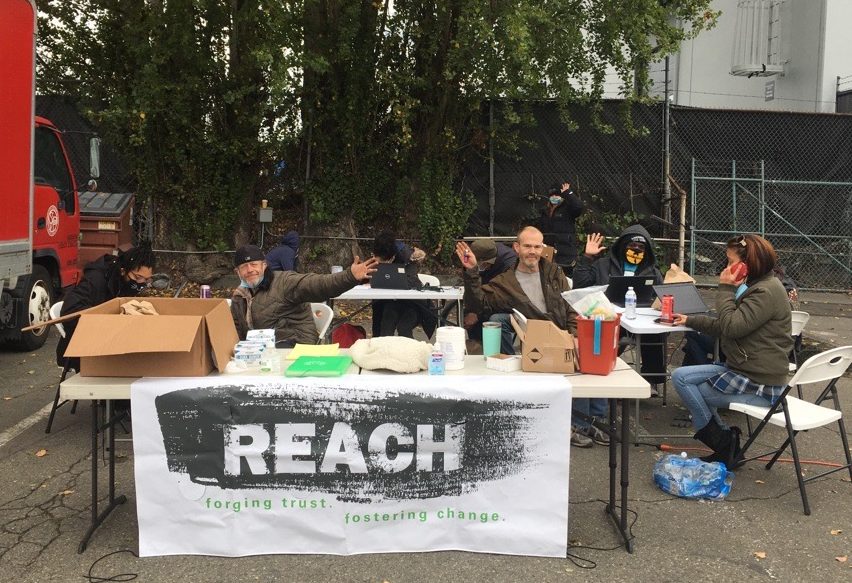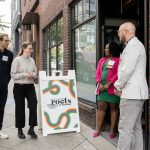
One of ETS’ core principles—and a principle of harm reduction more broadly—is to meet people where they are. Figuratively, this means meeting people where they are on their recovery journeys without judgment; literally, it means meeting people at their physical location to provide treatment and support.
With many services shuttered or experiencing delays because of the pandemic, our REACH team has been working overtime to make sure people experiencing homelessness are supported.
Last month, REACH started a program to better connect clients to available services. We’ve created pop-up spaces outdoors, alongside services people are already using, like food banks, to offer support in one place. Dawn Whitson runs the pop-up tent program at the St. Vincent de Paul Food Bank in Georgetown every Thursday. She says the tent allows her to serve people whose needs don’t qualify them for intensive case management but still have difficulty accessing services.

For example, if someone is eligible for Supplemental Security Income (SSI) benefits from Social Security, they often also qualify for limited-time assistance, called Aged, Blind, or Disabled (ABD) Cash until their SSI benefits start to arrive. The laborious ABD application process is difficult for people who do not have immediate access to the DSHS office, a computer, or an internet connection. Furthermore, the biggest roadblock for many clients is that the DSHS case manager has to call them back for an interview. If case managers like Dawn are no longer with the client when they call back, the client has to continue to wait for this much-needed assistance. This often happens as case managers must move around to support clients who live in different areas of the city.
Many activities can occur at once in the pop-up tent because Dawn can multitask and draw on the support of her colleagues. She can help someone apply for a Lifeline phone from Assurance Wireless online, while another REACH case manager speaks with DSHS in support of different client. At the same time, LEAD intake staff can help eligible clients get enrolled in the LEAD program. Clinic Services is exploring ways to do intake for substance use treatment at the pop-up tent. Dawn can also provide education on overdose prevention and provide Narcan—an overdose antidote—along with clean syringes and other harm reduction supplies. The tents become a “one stop shop” for critical services.
“This program helps people who are falling through the cracks,” Dawn says. “The pop-up services provide support to people whose needs are in the middle ground. They need more assistance than those who, for example, have all their identification paperwork and are currently mentally stable, but do not need the time-consuming, one-on-one intensive services that REACH can provide.”

In addition, these pop-up tents have created a venue for other service providers to effectively connect with our clients. United Way recently used the space to help people register to vote; NeighborCare can provide on-demand medical care; and Dawn often picks up ready-to-eat lunches from FareStart that clients can enjoy as they handle their various needs.
One highly anticipated partnership Dawn would like to coordinate is having a DSHS case manager on site to conduct interviews for ABD as well as facilitate Supplemental Nutrition Assistance Program (SNAP) benefits, and sign people up for Metro’s year-long bus pass—a program instituted just as Metro is beginning to again charge for rides. Having DSHS on site would remove barriers for clients who do not have internet access or phones.
While this program may not seem revolutionary for those who do not face the barriers many people who are homeless do, it can make a huge difference for those who are. Dawn has seen this first-hand.
“A gentleman came last week, and in the course of a couple of hours, we renewed his SNAP benefits, completed his application for DSHS’s $365 per year disaster relief money and ABD, set him up with a Lifeline phone, and got him a year-long bus pass,” she said. “The client was so relieved to finally make progress toward his goals during this challenging time.”
Last week, Dawn and other members of the REACH team served 20-25 people at the pop-up site, up from 10-15 people the previous week. She fully anticipates that as word spreads, she’ll those numbers increase.
“Our clients face so many barriers to social services. Bringing these services to where people already are—food banks like St. Vincent de Paul’s—breaks down some of the most constraining barriers of time and travel. It feels good to efficiently serve clients and to know that because we are here, they can take the bus where they need to go, get treatment for medical issues, and aren’t going to go hungry. Might not seem like a lot for some, but for many of our clients it’s life-changing,” Dawn said.




